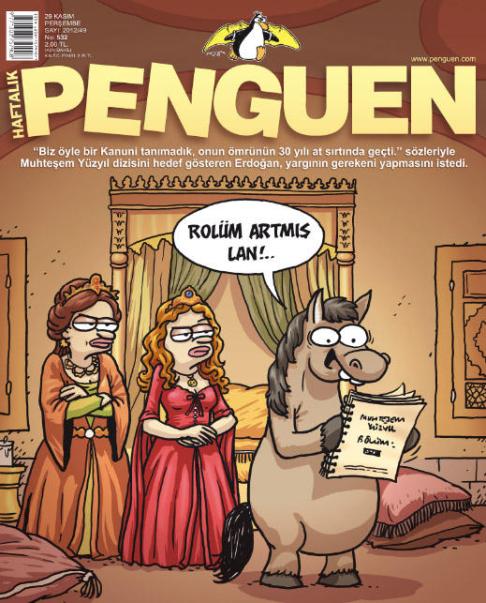Disappointed with a popular Turkish TV series (Muhtesem Yuzyil) on the life of Suleiman the Magnificent, Prime Minister Erdogan criticized its depiction of the successful, expansionist Ottoman Sultan Suleiman as a leader who never leaves the palace or his harem (Sultan’s family, concubines and children) instead, and threatened to file a formal complaint against the series’ producers, director and the owners of the TV channel which airs the series. It wasn’t the first time he condemned art, artists, musicians, writers, store names, etc., as widely discussed in the media. However, his criticism of the series had nothing to do with it violating Islamic or traditional/family values, such as when he suggested that ballet was “below the belly,” which he meant that it was pornographic. The irate speech he gave in which he attacks the series is quite significant for it not only reminds us about his well-known aspirations of gaining more power and legitimacy via his policies and interventions in the Middle East, but also shows that he wants to see an effective soft power machine that will make it easy for him to realize his dreams of imperial power –just like an American President who can always trust Hollywood to justify his actions.
Erdogan wants to expand his power and influence like Sultan Suleiman, whom Erdogan claims spent 30 years of his life on a horse, not in the harem, therefore, the series’ failure to depict Suleiman as a hero and role model is disappointing to Erdogan. He seems to make the assumption that the series doesn’t help to make his aspirations palatable to either domestic or foreign fans but could even hinder them. What is quite ironic here is that Erdogan sees the role of media and popular culture in the society in a similar way that Kemalists have been since the beginning of the modern republic in 1923, with one difference: Kemalists did not allow commercial radio-TV broadcasting until 1990 because they believed media had an important role in nation building and the reinforcement of official state ideologies, and feared that commercial media would complicate that project. While Erdogan inherits this belief, which is evident in his numerous public criticisms, he also seems to think that Turkish TV now has an important role, which is trans-nation building. In his speech, Erdogan responds to the opposition party’s criticisms: “They say ‘what are you doing in Gaza? Why are you so interested in Syria?’ …we’ll go everywhere that our ancestors went on horses and have interest in any place but I believe they think our ancestors are like the ones on television, like on Muhtesem Yuzyil.” As the comic below also illustrates it so wittily, his emphasis is on the horse, which signals expansion. His suggestion that expansion is what our ancestors have done implies that it should also be a part of our legacy today.
Known as “Sultan” in the Arab world, the series reaches 150 million viewers mostly in the Middle East. Thus, his concern in his criticism of the TV series is not whether or not it is obscene or promotes values against Islam but rather he is worried whether or not the TV Sultan can communicate this assumed legacy and help justify the ambitions of the real, contemporary hero/leader/Sultan of Turkey a.k.a Erdogan. His problematic ‘morality police’ type of attempts to correct that ‘flaw’ with the series have faced a huge backlash in the media. Erdogan had already been likened to the Sultan and criticized for his imperialistic hunger, neo-Ottoman agenda and disregard for democracy for some time now. Musa Kart’s recent caricature, entitled ‘Erdogan the Magnificent,’ which depicts Lady Justice as his favorite concubine, constitues just another good example. From Erdogan’s point of view, it must be quite unfortunate for 150 million viewers to think of Sultan Suleiman as a man with harem problems instead of a capable, sound leader like himself… Like any leader, Erdogan also understands how important it is to have the support of the media in order to gain and protect the consent of the people –soft power–, whether in national or transnational contexts. From my point of view, however, Erdogan should not confuse the roles of a democratically elected prime minister, whose job is to represent the citizens, and that of an Ottoman Sultan, who owned the land he captured and the people living in it — even if he has been welcomed warmly as a “Neo-Ottoman” in the Middle East.
Horse says: My role has gotten bigger!



Pingback: Ece Algan on the latest TV series crisis, Kamil Pasha on Turkish grade schoolers’ dress codes. A social fabric roundup… « Erkan's Field Diary
Pingback: In a lather: Ottoman soaps | The gypsy plays & the kurd dances
Pingback: On a BBC story on the success of Turkish TV shows in South America… « Erkan's Field Diary
Pingback: TURKISH NOVELAS IN CHILE; DATELINE SWEDEN by Toby Miller | CST Online